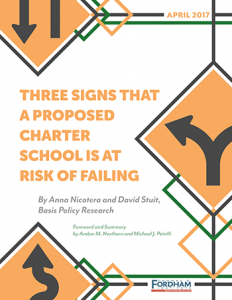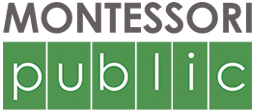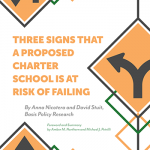“Child-Centered” Charters at Risk of Failure?

It’s great to have a study looking at different kinds of charter schools and their success rates, since it’s become clear that being a “charter school” in itself isn’t predictive of much—there’s a wide range of models and structures, with an equally wide range of outcomes. (Several interesting articles in the current Print Edition of MontessoriPublic make this very point.) The authors collected data from 639 charter school applications across four states, and looked carefully at the indicators that might predict success or failure. Still, the Montessori call-out doesn’t quite hold up on careful inspection.
The three “risk factors” were identified in the study:
- Lack of identified leadership: Self-managed (i.e., not part of a charter management organization, or CMO) schools which did not name an initial leader
- High risk, low dose: Schools planning to serve at-risk children without additional targeted academic support
- Child-centered curriculum: the aforementioned “child-centered, inquiry-based pedagogies, such as Montessori, Waldorf, Paideia, or experiential programs”
Let’s dig into what the study looked at. What does it really show?
The authors put together their set of indicators to examine from a wide range, taking a group of 50 candidates down to a set of 12 which were backed by research and easy to identify in charter applications. Further analysis and correlation of indicators with school performance measures boiled that list down to the three factors above. The first two, it should be noted, were combinations from the set of 12 which emerged in statistical analysis. That is, the combination of being self-managed and not identifying a leader raised the risk, and the same with the combination of high risk and low dose. Only “child-centered” emerged as a single factor, but as we’ll see, it’s not that simple.
The first two factors seem fairly objective and common-sense. The lack of a named leader and the absence of a CMO would be easily discerned in the application, and it’s easy to see how this could influence a school’s success—leadership matters. Out of 83 of these charters approved, 51% failed. Likewise, the high risk, low dose combination would be easy to detect, and certainly sounds like a recipe for disaster. Only 30 of these were approved, and the 60% failure rate is no surprise.
But when it comes to the third factor, the indicator starts to sound pretty broad. The coding indicator for this factor reads like this:
Applicant intends to implement one of the following instruction/curricular approaches: Montessori, Waldorf, Paideia, Experiential Learning, Expeditionary Learning, or other child-centered, inquiry-based approaches.
Where does this category come from? Well, the paper relies on the National Alliance for Public Charter Schools 2011-12 Survey, which identified nine “areas of instructional focus” including “child-centered” and “inquiry-based.” Included in these categories are the following models:
| Child-centered | Inquiry-based |
|
|
Which covers rather a lot of ground
Then we see that the sample size for this group was pretty small: out of 19 schools approved, 57% failed. So in the final analysis, out of 19 charter schools which may or may not have been Montessori programs, 11 performed poorly. This is a rather thin reed on which to support naming Montessori as a “risk factor”.
Beyond the statistical concerns, two substantive issues emerge from the study.
First, as the authors acknowledge, the measures of performance were “student growth and academic proficiency data … collected from state departments of education”, which is to say the conventional “high-stakes accountability” testing drawing increasing scrutiny. Are these the right measures for “child-centered” models? From the study:
the use of multi-age grouping of children in classrooms creates misalignment with standards-based education when the teacher needs to cover the standards of multiple grade levels in one class during the academic year
and
Standards-based accountability also makes it challenging for schools to encourage personalized and self-directed student learning
In fact,
authorizers may want to consider developing rigorous, mission-specific performance measures in addition to the standards-based measures that demonstrate whether the school has been successful in fullfilling its pedagogical approach
Furthermore, are these the right measures for any models? Academic achievement is important, but are the narrow tests in use today the complete measures of success? Alone, do they have predictive value beyond predicting scores on future tests? Additional assessments, such as measures of executive function and social-emotional flexibility, have been shown to predict lifelong positive outcomes, and there is growing evidence that fully-implemented Montessori excels at both academic preparation and these critical outcomes.*
What’s more, as the authors acknowledge, Montessori in particular can be challenging to implement well:
For Montessori schools, teachers need to receive extensive training to effectively observe children as they engage in child-directed discovery and provide carefully orchestrated sequences of hands-on activities.
In fact, with the term “Montessori” in the public domain, there’s little guarantee that the Montessori programs (if any) in the sample were at all authentic. That’s too bad, since, as the study states,
“There is some evidence that Montessori models, when implemented with fidelity, can lead to improvements in student academic outcomes.” *
Montessori, properly implemented, is a “child-centered” model structured around a highly developed, comprehensive academic curriculum that is not in conflict with measurable academic achievement. Fortunately, models and protocols exist for clearly defined, well-implemented Montessori. The National Center for Montessori in the Public Sector has developed an Essential Elements rubric, a coaching model, and the Developmental Environment Rating Scale (DERS), among other tools, to support public schools in implementing high-quality Montessori, and schools that the center has worked with are seeing outstanding outcomes, producing well-rounded individuals with both academic and social emotional capabilities that prepare them for success in life.
* See this 2012 study by Dr. Angelline Lillard, as well as other research summarized here.
Two interesting takes on the study, from education blogger and MontessoriPublic contributor Gary Houchens here, and Frederic Hess and Jenn Hatfield (of the American Enterprise Institute) here.
David worked in private Montessori for more than twenty years as a parent, three-to-six year-old and adolescent teacher, administrator, writer, speaker, and advocate. In 2016 he began working with the National Center for Montessori in the Public Sector. David lives in Portland, Oregon.





